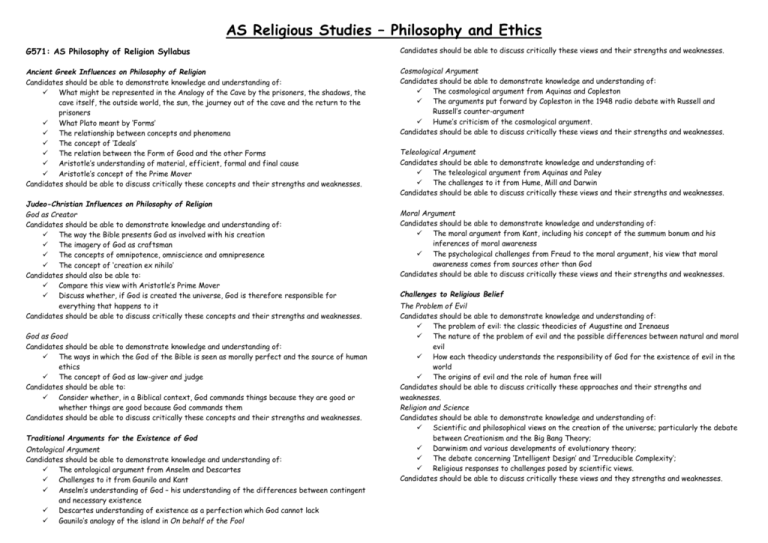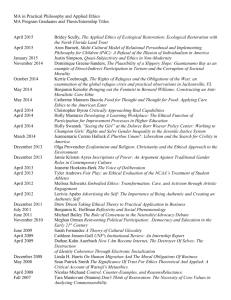RS Philosophy & Ethics
advertisement

AS Religious Studies – Philosophy and Ethics G571: AS Philosophy of Religion Syllabus Candidates should be able to discuss critically these views and their strengths and weaknesses. Ancient Greek Influences on Philosophy of Religion Candidates should be able to demonstrate knowledge and understanding of: What might be represented in the Analogy of the Cave by the prisoners, the shadows, the cave itself, the outside world, the sun, the journey out of the cave and the return to the prisoners What Plato meant by ‘Forms’ The relationship between concepts and phenomena The concept of ‘Ideals’ The relation between the Form of Good and the other Forms Aristotle’s understanding of material, efficient, formal and final cause Aristotle’s concept of the Prime Mover Candidates should be able to discuss critically these concepts and their strengths and weaknesses. Cosmological Argument Candidates should be able to demonstrate knowledge and understanding of: The cosmological argument from Aquinas and Copleston The arguments put forward by Copleston in the 1948 radio debate with Russell and Russell’s counter-argument Hume’s criticism of the cosmological argument. Candidates should be able to discuss critically these views and their strengths and weaknesses. Judeo-Christian Influences on Philosophy of Religion God as Creator Candidates should be able to demonstrate knowledge and understanding of: The way the Bible presents God as involved with his creation The imagery of God as craftsman The concepts of omnipotence, omniscience and omnipresence The concept of ‘creation ex nihilo’ Candidates should also be able to: Compare this view with Aristotle’s Prime Mover Discuss whether, if God is created the universe, God is therefore responsible for everything that happens to it Candidates should be able to discuss critically these concepts and their strengths and weaknesses. God as Good Candidates should be able to demonstrate knowledge and understanding of: The ways in which the God of the Bible is seen as morally perfect and the source of human ethics The concept of God as law-giver and judge Candidates should be able to: Consider whether, in a Biblical context, God commands things because they are good or whether things are good because God commands them Candidates should be able to discuss critically these concepts and their strengths and weaknesses. Traditional Arguments for the Existence of God Ontological Argument Candidates should be able to demonstrate knowledge and understanding of: The ontological argument from Anselm and Descartes Challenges to it from Gaunilo and Kant Anselm’s understanding of God – his understanding of the differences between contingent and necessary existence Descartes understanding of existence as a perfection which God cannot lack Gaunilo’s analogy of the island in On behalf of the Fool Teleological Argument Candidates should be able to demonstrate knowledge and understanding of: The teleological argument from Aquinas and Paley The challenges to it from Hume, Mill and Darwin Candidates should be able to discuss critically these views and their strengths and weaknesses. Moral Argument Candidates should be able to demonstrate knowledge and understanding of: The moral argument from Kant, including his concept of the summum bonum and his inferences of moral awareness The psychological challenges from Freud to the moral argument, his view that moral awareness comes from sources other than God Candidates should be able to discuss critically these views and their strengths and weaknesses. Challenges to Religious Belief The Problem of Evil Candidates should be able to demonstrate knowledge and understanding of: The problem of evil: the classic theodicies of Augustine and Irenaeus The nature of the problem of evil and the possible differences between natural and moral evil How each theodicy understands the responsibility of God for the existence of evil in the world The origins of evil and the role of human free will Candidates should be able to discuss critically these approaches and their strengths and weaknesses. Religion and Science Candidates should be able to demonstrate knowledge and understanding of: Scientific and philosophical views on the creation of the universe; particularly the debate between Creationism and the Big Bang Theory; Darwinism and various developments of evolutionary theory; The debate concerning ‘Intelligent Design’ and ‘Irreducible Complexity’; Religious responses to challenges posed by scientific views. Candidates should be able to discuss critically these views and they strengths and weaknesses. AS Religious Studies – Philosophy and Ethics G572: AS Religious Ethics Syllabus Ethical Theory Candidates should be able to demonstrate knowledge and understanding of: The concepts of absolutist and relativist morality; What it means to call an ethical theory absolutist and objective; What it means to call an ethical theory relativist and subjective: The terms deontological and teleological. Candidates should be able discuss critically these concepts and their strengths and weaknesses. Natural Law Candidates should be able to demonstrate knowledge and understanding of: The origins of Aquinas’ Natural Law in Aristotle’s idea of purpose; Aquinas’ ideas of purpose and perfection; The use of reason to discover Natural Law; The primary and secondary precepts. Candidates should be able to discuss critically these views and their strengths and weaknesses. Kantian Ethics Candidates should be able to demonstrate knowledge and understanding of: The difference between the Categorical and the Hypothetical Imperatives; The various formulations of the Categorical Imperative; Kant’s understanding of the universalisation of maxims; Kant’s theory of duty; Kant’s ideas of the moral law, good will and the summum bonum. Candidates should be able to discuss critically these theories and their strengths and weaknesses. Utilitarianism Candidates should be able to demonstrate knowledge and understanding of: The classical forms of Utilitarianism from Bentham and Mill; The principle of Utility; The differences between the Utilitarianism of Bentham and of Mill; The Hedonic Calculus, higher and lower pleasures, quantity v. quality, and Act and Rule Utilitarianism; The Preference Utilitarianism of Peter Singer. Candidates should be able to discuss critically these issues and their strengths and weaknesses. Religious Ethics Candidates should be able to demonstrate knowledge and understanding of: The main ethical principles of the religion studied (Christianity) and how the followers of the religion make ethical decisions; The ways in which religion and morality may seem to be linked or be seen as separate from each other; How far morality may be seen as dependant on God (Divine Command theory); How far religious ethics may be seen as absolutist or relativist; How ethical theories may be considered religious. Candidates should be able to discuss critically these issues and their strengths and weaknesses. Applied Ethics Abortion Candidates should be able to demonstrate knowledge and understanding of: The concept of “Sanctity of Life” and how it applies to abortion. The concept of personhood as applied to abortion. The right to life as applied to abortion and the rights of all those involved. The application and the different approaches of the ethical theories listed above to abortion. Candidates should be able to discuss critically these issues and their strengths and weaknesses. Genetic Engineering Candidates should be able to demonstrate knowledge and understanding of: the ethical questions raised by the different types of genetic engineering to humans, animals and plants; human embryo research; The application and the different approaches of the ethical theories listed above to genetic engineering. Candidates should be able to discuss critically these issues and their strengths and weaknesses. The Right to a Child Candidates should be able to demonstrate knowledge and understanding of: The issues of infertility and the right to a child; The status of the embryo; Whether a child is a gift or a right; The application and the different approaches of the ethical theories listed above to abortion and the right to a child. Candidates should be able to discuss critically these issues and their strengths and weaknesses. Euthanasia Candidates should be able to demonstrate knowledge and understanding of: The concept of the ‘Sanctity of Life’ and how it applies to euthanasia; The concept of the ‘Quality of Life’ and how it applies to euthanasia; The right to life as applied to euthanasia; The application and the different approaches of the ethical theories listed above to euthanasia. Candidates should be able to discuss critically these issues and their strengths and weaknesses. War and Peace Candidates should be able to demonstrate knowledge and understanding of: The principles of ‘Just War’ and its application; The theories of ethical and religious pacifism; The application and the different approaches of the ethical theories listed above to war and peace. Candidates should be able to discuss critically these issues and their strengths and weaknesses. AS Religious Studies – Philosophy and Ethics Reading List Core text: Taylor, Eyre and Knight. OCR Philosophy and Ethics AS, Heinemann Publishers, 2008 (you will be provided with a loan copy of this in your first lesson) Ethics Philosophy Recommended Reading (useful to have a copy of) Oliphant, J. OCR Religious Ethics for AS and A2 (covers Y12 and 13) Thompson, M. An Introduction to Philosophy and Ethics (covers Y12 and 13) Ahluwalia, L. Foundation for the Study of Religion Recommended Reading (useful to have a copy of) Taylor, M. OCR Philosophy of Religion for AS and A2 (covers Y12 and 13) Thompson, M. An Introduction to Philosophy and Ethics (covers Y12 and 13) Ahluwalia, L. Foundation for the Study of Religion Cole, P. Philosophy of Religion Wider Reading Tyler, S.K. and Reid, G. Advanced Religious Studies Vardy, P. The Puzzle of Ethics Macquarrie, J. (Ed.) A New Dictionary of Christian Ethics Pojman, L. Ethics: Discovering Right and Wrong Singer, P. Practical Ethics Thompson,M. Teach Yourself Ethics Useful Websites, Online Lectures/Podcasts www.rsrevision.com www.philosophicalinvestigations.co.uk www.philosophyonline.co.uk/pages/intro.ht m www.thatreligiousstudieswebsite.com www.iep.utm.edu www.academicearth.org/lectures/motivesand-morality www.philosophy.ox.ac.uk/podcasts www.philosophybites.com/ www.bbc.co.uk/radio4/history/inourtime/i nourtime_philosophy.shtml Wider Reading Tyler, S.K. and Reid, G. Advanced Religious Studies Vardy, P. The Puzzle of God Dawkins, R. The God Delusion McGrath, A.The Dawkins Delusion Vardy, P. The Thinker’s Guide to God Vardy, P. The Thinker’s Guide to Evil Other Sources There are often television and radio shows broadcast that are relevant to the study of philosophy and ethics. Your teacher will let you know when this happens. You should try to read a newspaper each week. You will often find articles that are relevant to what you are studying in philosophy and ethics. Make sure you choose a broadsheet such as the Guardian, the Independent or the Times. Newspapers are available to read in the library from the librarian’s desk. AS Religious Studies – Philosophy and Ethics Equipment needed for first lesson 2 A4 lever arch folders (one for Philosophy and one for Ethics) to store your handouts. Normal ring binders will not be big enough. A set of dividers for each folder. It would be useful for you to begin researching the first topics on the syllabus for Philosophy (Ancient Greek influences) and Ethics (Ethical Theory) to help you in your first few weeks. You may also find it useful to begin a glossary on pages in the back of your folders to help you learn new key terms as you research. Qualification details Course Tutor contact details Exam Board: OCR Ms Turner-Lindley (Philosophy) Website: www.ocr.org.uk gemmaturnerlindley@allertongrange.com Qualification code: H172 Mr Robinson (Ethics) Philosophy unit code: G571 paulrobinson@allertongrange.com Ethics unit code: G572 Head of Department Ms Turner-Lindley gemmaturnerlindley@allertongrange.com








